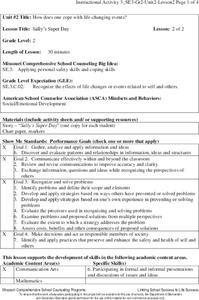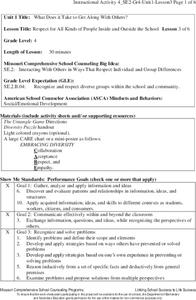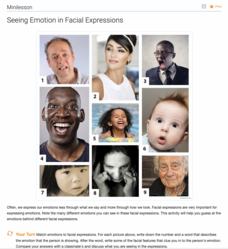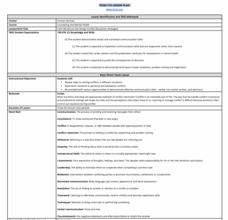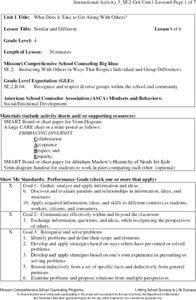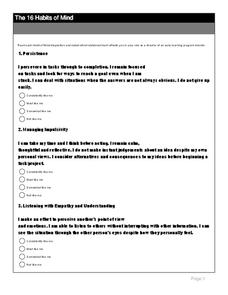Amani Project
Harmony Break! Mood Meter Floor Board
The big idea in the fourth lesson from the Amani Project is that people can experience different emotions in precisely the same event. One participant uses their body to express an emotion. Then other participants move to the area of the...
US Institute of Peace
Becoming a Peacebuilder
"Be the change you wish to see in the world!" The 15th and final lesson in a peacebuilding series uses this quote from Gandhi to prepare pupils for their own action projects. Individuals research a global issue, then brainstorm a method...
Missouri Department of Elementary
Sally’s Super Day
After having a bad day, Sally took scholars' suggestions and had a super day. Pupils listen to her newest short story then discuss the events that occurred. They sort each event by what was in her control and what was not. Participants...
Amani Project
Write a CoronaKindness Song
And the beat goes on! Finding a way to connect during the isolation imposed by the Coronavirus pandemic can be challenging. This activity from the Amani Project offers a way to stay close during a time of physical distancing....
Community High School of Vermont
Habits of Mind
Here is a comprehensive unit on the 16 Habits of Mind that includes a wide variety of activities, worksheets, differentiation strategies, and instructor notes. The unit consists of 18 lessons and offers an organized progression of...
Missouri Department of Elementary
Respect for All Kinds of People Inside and Outside the School
Why is it important to embrace diversity? Scholars explore the topic by learning about the CARE acronym: Collaboration, Acceptance, Respect, Empathy. They also complete a diversity puzzle worksheet and play a collaborative game that...
Do2Learn
Social Play Action Figures
Three activities stem from one hands-on project designed to explore character traits. Scholars create an action figure that reflects their personality to teach others about themselves and role play conversational skills.
University of Minnesota
Mirroring Emotions
Do you ever give your class the "teacher look"? Without saying a word, they become silent and engaged (hopefully). How do they know what you're thinking? Explore the concept of nonverbal communication and how it relates to our mirror...
Skills USA
Personal Growth and the Personal Leadership Inventory
What are employers looking for in prospective employees? Career-minded high schoolers examine their strongest technical skills as well as important 21st century skills, including leadership, empathy, clear communication, working well...
Thoughtful Learning
Using Perspective Shifting to Understand Others
Being able to see things from another's perspective is an important part of social awareness. A short activity permits scholars to practice perspective-taking, which in turn helps them develop empathy, appreciate diversity, and promote...
Ophelia Project
Let’s Be Friends
Introduce positive social skills and friendship to young learners with this wonderfully designed eight-lesson unit. It includes several activities to help learners identify positive attributes, build empathy, and understand the qualities...
Health Smart Virginia
Face of Mental Illness
To develop an understanding of the stigma surrounding mental health problems and the impact stigma and discrimination have on those who would seek help, groups investigate the symptoms of and risk factors associated with eight different...
Thoughtful Learning
Seeing Emotion in Facial Expressions
Learning to read body language, especially facial expressions, is the focus of a mini-lesson. Young learners examine a series of photographs, identify the emotion being illustrated, and then discuss the cues that revealed the emotion.
Texas Education Agency (TEA)
Can’t We All Just Get Along? Conflict Resolution Strategies
Respond rather than react—that's the big idea behind a instructional activity on conflict resolution strategies. A richly detailed plan teaches high schoolers strategies for resolving conflicts. Pupils play charades, engage in verbal and...
Health Smart Virginia
Face of Mental Illness
There are a lot of myths and misinformation out there about mental illness. Help set the record straight with a resource that debunks the falsehoods and provides high schoolers with accurate and important information about the various...
Health Smart Virginia
Surviving High School Awareness Campaign
To demonstrate what they have learned in the Health Smart unit, sophomores design a resource for incoming ninth-graders that includes what they consider the most important information they gleaned from one of the eight topics studied.
Health Smart Virginia
Emotional Intelligence Quotient
As an end of the Health Smart unit self-assessment, scholars design a cup with a logo and motto that reveals their emotional intelligence. To prepare, individuals complete a worksheet describing the seven Emotional Intelligence Quotients...
Missouri Department of Elementary
Similar and Different
Using a Venn diagram, pupils compare the similarities and differences between two classmates. Next, they review the CARE acronym (Collaboration, Acceptance, Respect, Empathy) and discuss how it applies to diversity in the classroom.
Curated OER
Words Hurt
Students identify the various forms of bullying in a class discussion and to sort out the situations that can hurt outside and inside. They count the number of bullying incidents posted on the bulletin board to find which occur most...
Center School
The 16 Habits of Mind
Which of Costa's 16 Habit of Mind best describes you? Take a short assessment to see which quality is most consistently like you, or which quality is not like you at all.
Missouri Department of Elementary
I Know What You Did This Summer
Developing and maintaining healthy interpersonal relationships is difficult, especially as middle schoolers begin dating. A short activity permits eighth graders to practice their skills as they consider how they should respond to a...
Missouri Department of Elementary
Juggling New Opportunities
Life is like trying to juggle three tennis balls! That's the big idea in a lesson that asks freshmen to consider that sometimes juggling the areas of their lives (social/emotion, academic, and career) runs smoothly and sometimes not so...
Teaching Tolerance
Reflection: What’s Your FRAME?
Encourage your class to recognize the diversity in the beliefs and backgrounds of their peers. Learners use the acronym FRAME to consider culture, background, and life experiences.
Bully Free Systems
Bully Free Lesson Plans—Seventh Grade
Having a hard time defining bullying with your seventh graders? Discuss the different types of behavior one would see in a bullying situation with a series of lessons, worksheets, and group activities.




